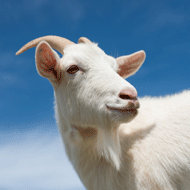Goats ‘can detect emotions’ in calls from other goats

This provides the first strong evidence that goats can distinguish between calls based on emotion.
Goats may be able to distinguish between positive and negative calls from other goats, scientists say.
An international study led by the Queen Mary University of London measured behavioural and physiological changes to find out if they can tell the difference between calls linked to positive emotions.
Scientists recorded goat calls associated with positive and negative emotions, then played them to other goats through a loud speaker, followed by a randomly selected final call.
According to the findings, when the emotion of the call changed, so did the likelihood of goats looking towards the source of the sound. The goats’ heart rate variability was also greater when they heard positive sounds, compared to negative.
This provides the first strong evidence that goats can distinguish between calls based on emotion, and that their own emotions may be affected. Such an ability could offer an evolutionary advantage among groups of animals that are not always in contact with each other, facilitating better coordination and cohesion in the group.
Lead author Dr Alan McElligott said: “Perceiving the emotional state of another individual through its vocalisations and being affected by those vocalisations has important implications for how we care for domestic animals, and in particular livestock species.”



 The Animal and Plant Health Agency (APHA) has updated its online reporting service for dead wild birds.
The Animal and Plant Health Agency (APHA) has updated its online reporting service for dead wild birds.